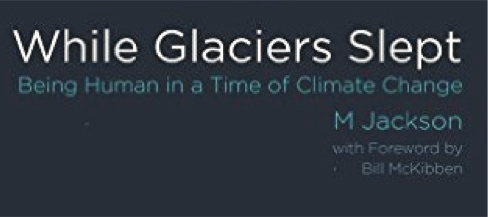On Thursday, Feb. 2, Seattle’s town hall held a program that changed the direction of climate change, and the voice that carries it. M Jackson, scientist and National Geographic Expert, shared her novel “While Glaciers Slept: Being Human In A Time of Climate Change” to the Seattle public, translating the language of science into a common feeling understood by all.
Jackson starts the novel by reflecting on a memory in her past. Taking place in the office of her parents, Jackson recounts to the audience how in this moment, she was cleaning up the life her mom and dad had once lived. As her story progresses, Jackson reveals that her parents had died of terminal cancer, leaving nothing but an empty home and possessions for their daughters to sort through.
Though this may seem like an odd start to take with a story about climate change, this, in actuality, is where the brilliance of Jackson can be found. Similar to Jackson’s family life changing, this can be related to the changing climate of the earth. Two very different stories made up by the same plot line. Jackson consistently throughout her work relates and refers to her personal life, connecting it to crisis that our climate is currently experiencing.
To break down the essence of what her book means, and its purpose, Jackson on Thursday focused on the topic of glaciers, sharing both her passion and deep connection that she has for them. Jackson had spent many years studying glaciers, and she explained how just like us, they to have stories. By simply making this distinction, Jackson was attempting to break the barrier that we hold between ourselves and the environment surrounding us.
By humanizing the glaciers, Jackson brings this natural phenomenon to a more personal level.
Found in both her book and lecture, the main motive Jackson has is getting the audience to care. To push them to understand that the topic of climate change, the topic environmental issues holds in society, is as important and concerning as our own lives are to us, we may begin to prioritize and consider the severity the health danger that our world is experiencing.
In Jackson’s final attempts to connect with those listening and reading, she ends with the mind bending thought that glaciers have gender. This wasn’t a mistake or poor play of words, but exactly what she meant. Jackson explained how when visiting one of the sites that she was conducting a study at, the story of how glaciers have genders was shared with her. What purpose the story she presented may have provided was once again, not viewing climate change as such an unattainable idea. By believing these glaciers to have gender and stories, Jackson created a reality that worked with the intention to generate compassion from us, to understand that the ‘pain’ these glaciers were experiencing was something we could relate to.
If your looking for good read with little thought and simplistic ideas, I suggest you keep looking. If though, you would like to challenge what you thought you understood about climate change, and instead, be introduced into a mindset that could alter how you view the world, While Glaciers Slept: Being Human In A Time of Climate Change is a read that will pleasantly challenge. I hope for you to go beyond what you know, I hope for you to break the barrier that stands between a escalating crisis that effects our present and future. Jackson writes not to disappoint, but enlighten a neglected mindset.
Shelby may be reached at
sbarnes@su-spectator.com









